Minami-san, at the start, you mentioned doing work that only an independent developer can do.
Yes.
The way you see it, what kind of work is that? PlatinumGames has a distinctive philosophy and is – in a good way – uncompromising. It really comes across that you’re an organisation of a different stripe.
The model we aim for is the relationship between Western development studios and publishers.
That’s right.
The people at development studios in Europe and America are being funded by publishers but won’t do everything they’re told.
Right! (laughs)
We want to preserve that even relationship while making the games we want. If we fail, the company will break up, and if it goes well, we’ll say, “Take that!” I think that kind of relationship is good. After all, the ones who think about the players the most and face them and strive to make something for them are the game makers.
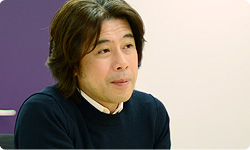
The actual developers.
If a large-scale company makes video games, there are all kinds of factors, like when profits need to be made and when something has to be released.
Like, “We absolutely must have it at this particular time.”
Then depending on the circumstances you start cutting corners somewhere and have to hurt the quality somehow. But we couldn’t stand that, so for that reason, as an independent developer, I want to make demands and be a group that makes things.
And we do keep making demands, but in order to do that, generating results is crucial. Besides, while there is a difference in position in that we receive money from a publisher to make games, we still want to keep that equal relationship.
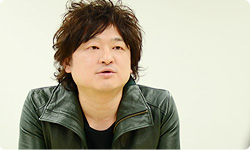
So, this may not be the most accurate description, but what you are saying is that you want to be an independent development company who talks big and then puts out results, without any particular fund invested on your capital, right?
That’s right.
To put it another way, when it comes to the final decision about what to offer the players, you take that responsibility in making the game.
That’s right. We want to take responsibility.
By declaring that so clearly, you put yourself in that position.
Yes. We just love putting ourselves in corners! (laughs)
I see! (laughs)
If you don’t keep making good things, the players will look the other way and the company itself will no longer be able to exist.
You might say that you proactively take risks.
Yes.
Companies generally try to find ways to decrease risk, but looking at PlatinumGames, the way you take risks is oozing from the whole company. (laughs)
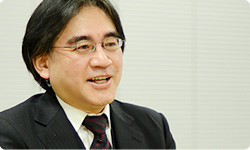
(laughs)
Company-wise, however, I don’t think that’s any good. A professional business manager would say, “First, secure profits.” What we do now is if profits arise, we use those profits…
You say, “Let’s make something even better!”
Yes, that’s the way we are. And the development staff members also really want to give the players the best games possible, so the risk simply isn’t in their heads.
If you try to make something better, it takes money and time.
If I ask (Hideki) Kamiya-san21 or Inaba-san and those guys about that, they respond, “Why? What’s wrong?”21. Hideki Kamiya: A video game designer, formerly of Capcom, who is now at PlatinumGames. His representative works include Resident Evil 2, Devil May Cry, Viewtiful Joe, Ōkami and Bayonetta.
As if to say, “Well, we do have to make something great, you know.” (laughs)
Yeah! (laughs)
But Kamiya-san’s way of thinking is far out. I’m a little more…
On my side. (laughs)
(laughs)
Right now, we’re keeping a balance. But if we don’t do that right now, PlatinumGames has no future.
What is the meaning behind the name PlatinumGames?
It signifies a company that is valuable like platinum, high quality, and shines a never-changing light. In line with that name, we have to make high-quality titles, so I named the company PlatinumGames. But sometimes I think I gave it quite a grand name! (laughs)
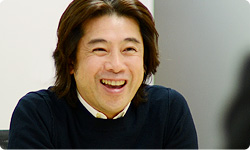
Again, it does put you in a corner.
So true! (laughs)
So when you described yourself as a group that likes putting yourselves in corners earlier, that may have been right to the point. I get the impression that by doing that, you’re inspiring your own sense of responsibility.
Yes. It’s a company name that brooks no excuses.
About three years ago, we made Bayonetta22, and it was a very symbolic title for us. We started by being told we could make anything we wanted.22. Bayonetta: An action game released by SEGA in January 2010. PlatinumGames is currently developing Bayonetta 2 for Wii U.
No one said, “Make this kind of game.” Instead, they said, “It’s in your hands.” And that’s how Bayonetta began.
Yes. But we didn’t begin making it right away. A lot of ideas came up.
Everyone had their own ideas about what they wanted to make.
Some on the staff said they wanted to make a vertically-scrolling shooter. In a very hypothetical scenario, if we really pushed that as a company, we could have made that, but everyone on the staff thought, “Our natural abilities lie in this direction, so we should make use of that to make something high-quality,” and what we made was Bayonetta.
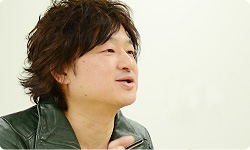
It’s not like Inaba-san and I forced it through.
If it hadn’t been for that, I think the company would have gone a different direction. If we had made an RPG, I think the image of the company would have been different. That game determined a lot of what is expected of PlatinumGames.
© 2024 Nintendo.